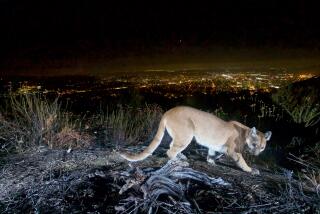Local mountain lion gives birth to three cute kittens
- Share via
The faces of the mountain lion cubs born recently in the Santa Monica mountains — with deep blue eyes, curving spots, budding teeth and whiskers — are cuter than their names.
But males P-82 and P-83 and their sister, P-84, aren’t just bringing good looks north of Los Angeles. Biologist Jeff Sikich said they may be carrying much-needed genetic diversity too.
The cubs are thought to be 3-year-old P-54’s first litter, a news release from the Santa Monica Mountains National Recreation Area said. More than four months ago, GPS radio collars showed P-54 traveling with P-63, an adult male. Such proximity often indicates mating, said Sikich, who has studied the big cats in the recreation area since 2002.
“Gestation on a mountain lion is 90 days, so I circled 90 days on a calendar and waited for that point,” he said.
Some three months later, Sikich saw a cluster of points when he looked at mother P-54’s GPS data, which indicated to him the cat had either made a kill or given birth.
When biologists went to check out the location, the latter proved true.
Sikich popped in on the kittens while P-54 was away. As a colleague monitored the mom, the biologist crawled through brush and snagged the newborns. After a check-up involving measurements, genetic tests and ear-tags, he placed the cubs back in the den.
“They blend in, it’s amazing. They blend in so well with their surroundings,” Sikich said. “Even at such a young age, they’re still real feisty, snarling and swiping.”
Presumptive father P-63 hails from the northern side of the 101 Freeway, where greater genetic diversity exists among a larger mountain lion population, Sikich said. The cat has crossed the freeway three times since he was captured and outfitted with a GPS collar in February 2018.
Now, as the only collared adult male cougar living in the Santa Monica Mountains, he seems to have shared his foreign genes with a population in need.
Sikich described the range where the kittens were born as an island.
“It’s bordered on the south by the Pacific Ocean, of course, and then the three remaining sides by freeways and development,” he said.
That makes it awfully hard for nonlocal mountain lions to get in. According to Sikich, males of the species typically require about 150 square miles of range, and females usually take up 50 square miles.
“So the lions are trapped,” he said. That could lead to inbreeding, which may harm the population over time.
“It basically affects their ability to reproduce and their survival as well,” he said.
Sikich said inbreeding could devastate the puma population in the Santa Monica Mountains. He and other rangers study the movement of the cats in an effort to better preserve the species. The park also contributes to efforts to build a wildlife crossing over the 101 Freeway, which would improve genetic diversity by allowing mountain lions to come and go from the otherwise cut-off area.
Such a bridge would also protect the animals from cars. P-54’s mother, P-23, was found dead near the side of Malibu Canyon Road in January 2018.
The new litter is the 17th identified in the Santa Monica Mountains since the National Park Service began studying the species there in 2002. Other conservation efforts include a push to label mountain lions as a threatened species in Southern California. Only the state can make such a designation.
“They are a symbol of wildness. They keep our wilderness areas wild. I think it would be a sad day for many if people no longer had lions,” Sikich said.
The species is also ecologically important because it is the last remaining large carnivore in the area, he said.
The new kittens help preserve the species’ future in the Santa Monica Mountains, but that’s not all they do. A post on the park’s Facebook page made by Ranger Ana Beatriz Cholo offered another reason. Amidst a deadly pandemic and an emotional national dialogue about race and civil rights, “times are tough,” the post explained.
“With this in mind, we hope that our recent discovery of a den of mountain lion kittens can perhaps bring a smile to your face today,” Cholo wrote.
More to Read
Sign up for Essential California
The most important California stories and recommendations in your inbox every morning.
You may occasionally receive promotional content from the Los Angeles Times.











